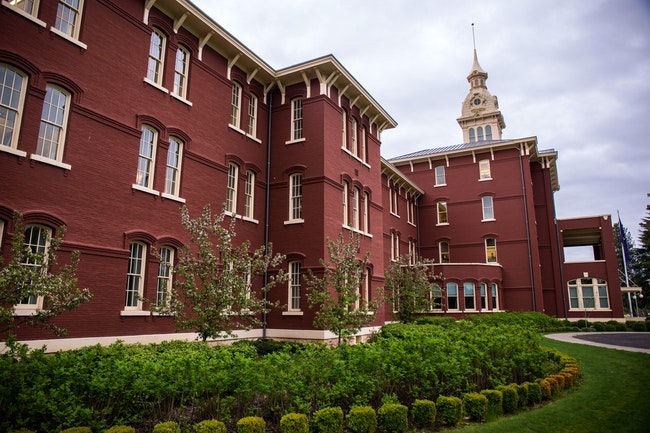
The Oregon State Hospital this week took the unprecedented step of calling for the National Guard to help care for hundreds of Oregon’s most severely mentally ill people.
It’s the final step in a five-stage plan the hospital created to deal with a worsening staffing crisis that has deepened in recent weeks.
One-third of the nursing staff on the Salem campus are now out on leave, up from 20% in late April.
Hospital administrators requested National Guard help on Wednesday morning, spokeswoman Rebeka Gipson-King said. They’re seeking 30 registered nurses and licensed practical nurses from the guard to work 10-hour shifts to provide around-the-clock care for more than 500 patients.
Gipson-King said to her knowledge, it’s the first such request for National Guard assistance since the hospital opened in Salem in 1883.
Major Stephen Bomar, spokesman for the Oregon Military Department, said Gov. Kate Brown will make the call to activate the National Guard. He said the department is routinely coordinating and planning with other agencies to provide support. Currently, the National Guard is seeing some of its capacity freed up as the state winds down mass vaccination sites, he said.
Gov. Kate Brown’s communications staff didn’t respond to a call or emailed questions about her response to the request as of Thursday evening.
Pat Allen, Oregon Health Authority director, is also asking managers from other departments within his agency as well as other state agencies to volunteer for shifts at the hospital. That request was the fourth step in the crisis staffing plan.
“As you know, the pandemic has been taking its toll on our coworkers, those who have been sick, those caring for sick loved ones, and those who’ve lost childcare due to the pandemic. For many state agencies, this means important work may be put on hold — but the hospital doesn’t have that option,” Allen said in an email sent Tuesday to about 5,000 state agency managers and supervisors.
He said the state would prefer people with nursing or patient care experience and familiarity with the behavioral health system.
But the email made clear the hospital can’t afford to be picky.
“Any extra sets of eyes or hands will help,” Allen wrote.
Those who volunteer will continue to be paid for their regular jobs and would receive six days of orientation and nine days of training in “basic nursing tasks,” followed by on-duty orientation with a mentor.
Gipson-King said the hospital activated both steps this week because of a significant increase in the number of employees on leave. She said as of Thursday, two state employees from outside the hospital had volunteered.
“We are basically using all of the tools in our toolkit to make sure we have adequate staffing,” Gipson-King said. She said the hospital is in the process of hiring 70 nurses. Those include employees to fill vacant positions and staff a relief pool, as well as temporary and contract jobs.
The hospital cares for hundreds of Oregonians with severe mental health issues who have been ordered to the hospital by judges. As of May 24, the hospital’s census was 526 patients in Salem, according to federal court documents.
Some commitments are civil, meaning a judge determines a person should be required to get mental health treatment. That group includes 11 current patients.
Many are tied to a criminal case. Those include people facing criminal proceedings who require mental health care so they can understand the charges against them and assist in their own defense, representing 368 current patients. Others include people found guilty except for insanity in criminal cases who are considered a danger to public safety without mental health treatment, representing 147 patients.
Staffing shortages have been a persistent challenge at the hospital since the Covid pandemic began in early 2020.
Unlike other state agencies which have flexibility in their work, the hospital must care for patients 24 hours per day, seven days per week. No matter how many employees are on leave or positions vacant, patients still need care.
In November, the hospital adopted a five-step crisis staffing plan. The first three steps called for hospital employees working in other departments to be reassigned to nursing. That meant treatment specialists, vocational coaches and food service workers were put on duty.
Employees have said those reassignments compromise patient care by shuffling staff to patients who aren’t familiar with them and leaving other duties unfilled.
Even before the pandemic began, state hospital work was demanding and often required long hours.
Angelica Ceja Ochoa, who’s worked as a mental health therapy technician for the past 13 years, said she helped keep patients safe, assisting with their medications and other daily needs.
During that time she watched people with undiagnosed mental illness or who had long been under the influence of drugs or alcohol stabilize through medications or other therapies. Ceja watched them have breakthroughs and improve to the point they could reintegrate into their communities.
But Ceja said it remained a difficult job. Overtime was always mandated and she typically worked 50 to 60 hours a week. She also cared for patients who had been accused of violent offenses. She witnessed patients assault each other and staff. She said there was never enough staff, which she said made her working conditions even more unsafe.
Then came the pandemic.
“The pandemic has magnified it and left the hospital unable to handle a percentage of what’s needed,” she said.
Ceja described how school closures exacerbated staffing shortages as staff had to take time off after getting sick or having to care for their kids whose schools and daycares had closed.
“My coworkers said, ‘How are we going to do this? What are we going to do?’” recalled Ceja, who last September took a temporary position as a liaison between her union, SEIU Local 503, and state government.
She said pandemic restrictions and reduced staff have made it harder to treat patients, who have been clustered together to prevent spread of the virus. Less staff have increased the risk of assault, she said.
Ceja said she’s immunocompromised and she and other coworkers were always worried they’d bring the virus home.
As the staffing shortage worsened, the hospital increasingly relied on mandated overtime to cover care. From April 1 to May 26, hospital employees were ordered on 546 occasions to work a total of 2,851 overtime hours. In 2019 during the same time period, only five employees had mandated overtime, totaling 37 hours.
Ben Morris, spokesman for SEIU Local 503, said the current budget for the hospital doesn’t even remotely cover its staffing needs.
He said that staffing at the hospital has decreased while the number of patients with acute needs increased. That’s led to more severe staff injuries because response times for help dealing with assaultive patients are longer.
To overcome the shortage, the hospital has relied on overtime with staff working 18-hour shifts several days, he said.
“The Legislature needs to budget for the needs of the Oregon State hospital and they’re not close to that right now,” he said.
Morris said SEIU Local 503 represents about 1,800 workers at the hospital including nursing as well as cleaning and food service staff. He didn’t have a specific figure for how much more money should be directed toward the hospital but pointed out that the Legislature has an unprecedented amount of money from federal stimulus money.
The hospital reported 20% of its nursing staff were on Covid-related leave in late April. That number stood at 33% last week.
Gipson-King said she didn’t have an explanation for the increase.
Employees may take Covid-related leave if they are ill, need to care for someone who is sick with Covid or have childcare arrangements disrupted due to the pandemic.
Last week, 412 nursing employees were on leave for at least one-quarter of their scheduled work time, according to a May 20 presentation hospital superintendent Dolly Matteucci gave the hospital’s advisory board.
Gipson-King said most of those employees out requested leave because of care responsibilities. Hospital employees told The Oregonian/OregonLive in April that some employees without children were taking time off intended for childcare, and said the hospital does not check whether employees have children.
Gipson-King said the hospital can’t verify whether employees who take care leave have children because of “privacy,” though she could not immediately cite a specific law or policy the practice was based on.
She said hospital supervisors have been contacting employees on leave to see if alternate schedules could help them return to work.
On Tuesday, Matteucci emailed hospital managers notifying them they would be required to work weekend shifts starting Memorial Day weekend through the Fourth of July to help stem the staffing crisis.
“We understand the hardship this may cause you and your families. We have exhausted all other staffing options for the hospital’s Salem campus. This includes calling people to see if they can work different schedules, offering overtime, hiring more temporary workers, signing additional agency contracts and keeping our Emergency Staffing Plan activated at Wave 3,” Matteucci wrote in an email.
On Tuesday, May 25, U.S. District Court Judge Michael Mosman granted a request by the Oregon State Hospital and the Oregon Health Authority to restrict admissions at the hospital for a week because of a lack of beds.
The order stems from an ongoing court case that started in 2002 over the state’s handling of cases where defendants were deemed unable to aid and assist in their cases because of a qualifying mental disorder. The court earlier ruled that the hospital must within seven days admit people deemed unable to participate in their defense.
Gipson-King said that the hospital complied with the requirement until 2019.
Since the pandemic, the federal judge has allowed the hospital to restrict admissions on multiple occasions after it was getting more people coming in than it could discharge to make room, Gipson-King said.
Court filings describe how since last May the hospital has accepted a group of 19 to 23 new patients each week who were quarantined in a special admissions unit until they tested negative for Covid. After the group was moved into regular hospital settings, the admissions unit would be cleaned and prepared for the next.
But in 2021 the number of new aid-and-assist orders to admit people to the hospital increased markedly with 82 orders per month in the first three months of the year, court filings state. The lowest number of new orders in that time frame has been 61, which is about the highest monthly number of orders the hospital received during any month in 2017, according to court filings.
Hospital officials stated in court filings that the “admission of a large number of new patients every week can and sometimes does outpace OSH’s ability to discharge aid-and-assist patients into community settings or to return them for the resumption of their criminal cases.”
The hospital said in court filings that it must place 19 to 23 patients every week into a setting outside to keep up with the influx of new admissions. On Monday, May 24, the hospital stated in a court filing that all of its beds are occupied and no more patients could be admitted.
“As before, OSH is operating close to 95 percent managed capacity, which is significantly higher than is optimal for psychiatric hospitals, but is necessary to admit as many people who require the hospital’s services as possible,” the filing said. “OSH under 95% capacity.”
Gipson-King pointed to multiple bills currently in the Legislature aimed at resolving the logjam at the hospital. They include improving the state’s crisis care network and mental health treatment infrastructure and adding units at the Oregon State Hospital’s Junction City campus.
Ceja said she’s nervous about returning to the Oregon State Hospital after her temporary position ends. But she said she will definitely return.
“I don’t believe I could find another job where I could help people as much as that would be fulfilling,” she said.
Correction: This article was updated to clarify that hospital employees were ordered to work overtime on 546 occasions, not that 546 employees were ordered. Salem Reporter regrets the error.
Related coverage: Oregon State Hospital situation “dire,” National Guard asked to help staffing
Contact reporter Rachel Alexander: [email protected] or 503-575-1241. Contact reporter Jake Thomas at 503-575-1251 or [email protected] or @jakethomas2009.
JUST THE FACTS, FOR SALEM – We report on your community with care and depth, fairness and accuracy. Get local news that matters to you. Subscribe to Salem Reporter starting at $5 a month. Click I want to subscribe!









